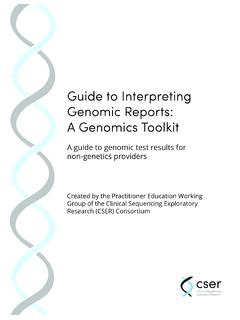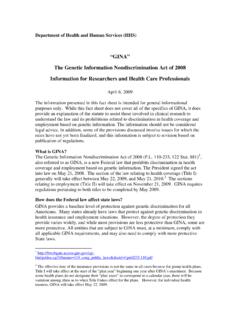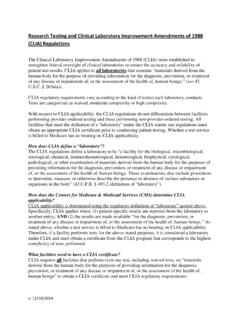Transcription of Essential Genetic and Genomic Competencies
1 For Nurses with Graduate Degrees Essential Genetic and Genomic Competencies Established by Consensus Panel September 2011. Essential Genetic and Genomic Competencies for Nurses with Graduate Degrees Karen E. Greco, PhD, RN, ANP-BC, FAAN. Susan Tinley, PhD, RN, CGC. Diane Seibert, PhD, CRNP, FAANP. Established by Consensus Panel September 2011. Library of Congress Cataloging-in-Publication Data Greco, Karen E. Essential Genetic and Genomic Competencies for nurses with graduate degrees / Karen E. Greco, Susan Tinley, Diane Seibert. p. ; cm. Includes bibliographical references. Summary: Describes and delineates the thirty-eight Essential Genetic and Genomic Competencies that inform the practice of all nurses functioning at the graduate level in nursing, summarizes the key documents and processes used to identify these Competencies , and identifies the members of the Steering, Advisory, and Consensus Panel committees involved --Provided by publisher.
2 ISBN 978-1-55810-437-2 -- ISBN 1-55810-437-2. I. Tinley, Susan. II. Seibert, Diane. III. American Nurses Association. IV. International Society of Nurses in Genetics. V. Title. [DNLM: 1. Genetics, Medical--standards--United States. 2. Clinical Competence- -United States. 3. Education, Nursing, Graduate--standards--United States. 4. genomics --standards--United States. QZ 50]. 616'.042--dc23. 2011049764. This publication Essential Genetic and Genomic Competencies for Nurses with Graduate Degrees reflects the thinking of the nursing profession on various issues and should be reviewed in conjunction with state board of nursing policies and practices. State law, rules, and regulations govern the practice of nursing, while Essential Genetic and Genomic Competencies for Nurses with Graduate Degrees guides nurses in the application of their professional skills and responsibilities. The opinions in this book reflect those of the authors and do not necessarily reflect positions or policies of the American Nurses Association or the International Society of Nurses in the Genetics and genomics .
3 Furthermore, the information in this book should not be construed as legal or other professional advice. The PDF of this publication is available on the ANA website at and also on the ISONG website at 2012 American Nurses Association and International Society of Nurses in Genetics. All rights reserved. Any part of this book may be reproduced or utilized in any form or any means without permission in writing from the publisher. Please, however, cite this publication as the source: Greco, K. E., Tinley, S. & Seibert, D. (2012) Essential Genetic and Genomic Com- petencies for Nurses with Graduate Degrees. Silver Spring, MD: American Nurses Association and International Society of Nurses in Genetics. ISBN-13: 978-1-55810-437-2 Published: March 2012. Table of Contents Steering Committee, Advisory Panel, and Consensus Panel .. iv Executive 1. Introduction and Background .. 2. Purpose and 3. 3. Development of the Competencies and Process of 5.
4 Resource/Reference Documents Competency Development and Process of Consensus Endorsement 8. Development of Performance Indicators and Educational 8. 9. Essential Competencies in Genetics and genomics for Nurses with Graduate 10. Professional 10. Risk Assessment and Interpretation Genetic Education, Counseling, Testing, and Results Interpretation Clinical Management Ethical, Legal, and Social Implications (ELSI). Professional 12. Professional Role Leadership Research 14. Endorsing 18. Genetic / Genomic Online 19. iii Steering Committee, Advisory Committee, and Consensus Panel Steering Committee Members Affiliations Karen E. Greco, PhD, RN, ANP-BC, National Cancer Institute, Center for FAAN Cancer Research, Genetics Branch Susan Tinley, PhD, RN, CGC Creighton University Diane Seibert, PhD, CRNP, FAANP Uniformed Services University Advisory Committee Members Affiliations Kathleen Calzone, PhD, RN, APNG, National Cancer Institute, Center for FAAN Cancer Research, Genetics Branch Jean F.
5 Jenkins, PhD, RN, FAAN National Human Genome Research Institute Carol J. Bickford, PhD, RN-BC, American Nurses Association CPHIMS. Quannetta Edwards, PhD, FNP, American Academy of Nurse WHCNP, FAANP Practitioners Suzanne Feetham, PhD, RN, FAAN Children's National Medical Center & University of Wisconsin, Milwaukee Tracy Klein, PhD, RN, FNP-BC, Oregon State Board of Nursing FAANP. Kathy McGuinn, MSN, RN, CPHQ American Association of Colleges of Nursing Karen Pehrson, MS, PMHCNS-BC Sigma Theta Tau International Cynthia A. Prows, MSN, CNS, FAAN Cincinnati Children's Hospital Medical Center Jo Ellen Rust, MSN, RN, CNS National Association of Clinical Nurse Specialists Elizabeth Thomson, DNSc, MSN, National Human Genome Research RN, CGC, FAAN Institute Janet K. Williams, PhD, RN, PNP, University of Iowa FAAN. iv *Consensus Panel Members Affiliations Michelle Beauchesne, DNSc, RN, National Association of Pediatric CPNP, FNAP, FAANP Nurse Practitioners Linda Callahan, PhD, CRNA, American Association of Nurse PMHNP Anesthetists Duck-Hee Kang, PhD, RN, FAAN Asian American/Pacific Islander Nurses Association Carole Kenner, PhD, NNP, RNC- Council of International Neonatal NIC, FAAN Nurses Elizabeth A.
6 Kostas-Polston, PhD, National Association of Nurse APRN, WHNP-BC Practitioners in Women's Health Ann Maradiegue, PhD, FNP-BC, National Organization of Nurse FAANP Practitioner Faculties Carrie Merkle, PhD, RN, FAAN American Academy of Nursing, Genetic Health Care Expert Panel Carmen T. Paniagua, EdD, RN, CPC, National Association of Hispanic ACNP-BC, APNG, FAANP Nurses Nancy Roehnelt, PhD, NP-BC Oncology Nursing Society Barbara M. Raudonis, PhD, RN, National Gerontological Nursing FNGNA, FPCN Association Lynneece Rooney, MSN, CNM, American College of Nurse- RNC-OB Midwives Catherine Ruhl, MS, CNM Association of Women's Health, Obstetric and Neonatal Nurses Kathleen Sparbel, PhD, RN, FNP-BC International Society of Nurses in Genetics Ida Johnson-Spruill, PhD, RN, LISW, National Black Nurses Association FAAN. Lois A. Tully, PhD National Institute of Nursing Research Mary Weber, PhD, APRN, PMHNP- International Society of Psychiatric- BC Mental Health Nurses *The Consensus Panel also includes the Steering Committee and Advisory Board members v vi Executive Summary Genetic and Genomic scientific advances are redefining our understand- ing of health and illness, necessitating a concomitant shift in graduate nursing education and practice.
7 The primary purpose of this document is to identify Essential Genetic and Genomic Competencies for individu- als prepared at the graduate level in nursing. These Competencies ap- ply to anyone functioning at the graduate level in nursing, including but not limited to advanced practice registered nurses (APRNs), clinical nurse leaders, nurse educators, nurse administrators, and nurse scien- tists. These Competencies complement existing nursing Competencies and standards of practice and are intended to incorporate genetics and genomics into all clinical and non-clinical nursing roles. They build on the Essentials of Genetic and Genomic Nursing: Competencies , Curri- cula Guidelines and Outcome Indicators (Consensus Panel, 2009) and assume that nurses with graduate degrees have already achieved those core Competencies . Because the APRN role has a different legal scope of practice than that of other nurses with graduate degrees, some com- petencies have been identified as unique to APRNs.
8 The 38 Competencies are organized under the following major catego- ries: 1. Risk Assessment and Interpretation 2. Genetic Education, Counseling, Testing, and Results Interpretation 3. Clinical Management 4. Ethical, Legal, and Social Implications (ELSI). 5. Professional Role 6. Leadership 7. Research 1. Introduction and Background Genetic and Genomic scientific advances are redefining our under- standing of health and illness. Many common health conditions have been identified as having a Genetic and/or Genomic component, and mounting evidence supports that these multifactorial conditions result from the interactions of multiple genes and environmental, lifestyle, and other factors (Guttmacher, Collins, & Drazen, 2004). Hundreds of Genetic tests are now available which can identify individu- als who carry one or more gene mutations associated with an increased risk of developing common health conditions.
9 Increased availability of Genetic testing and consumer access to this testing over the internet are moving Genetic testing away from trained genetics health professionals and into the hands of primary care providers and consumers (Greco & Mahon, in press). This increased access to Genetic information and technology brings with it a host of ethical challenges, including main- taining Genetic privacy, facilitating ethical decision-making concerning whether to undergo Genetic testing, and protecting the confidentiality of Genetic / Genomic information. Nurses prepared at the master's and doctoral levels are at the interface of translating these Genetic and Genomic advances into client care, in- tegrating Genomic health care into health care systems, and addressing the ethical challenges associated with Genetic information and technol- ogy. As the public continues to become more aware of Genetic and Genomic contributions to health and disease, nurses will be even more on the front lines, addressing genetics/ genomics questions and the ethi- cal issues that go with them (Greco, 2009).
10 Nurses with graduate degrees are also increasingly asked to provide leadership in caring for clients who have Genetic conditions, concerns, or potential Genetic components to their health and disease. Advances in genetics and genomics necessitate the integration of the appropriate content in nursing curricula to provide the knowledge and skills needed for graduate-level nursing practice, education, and research. Genetic and Genomic Competencies are integral to the practice of nurses prepared at any graduate level, regardless of academic preparation, practice set- ting, role, or specialty. This need is evidenced by the 2011 revision of the American Association of Colleges of Nursing's (AACN) Essentials of 2. Master's Education in Nursing, which includes several references to ge- netics and genomics distributed across three discreet essentials (AACN, 2011). These graduate nursing Competencies build upon the Essentials of Genetics and Genomic Nursing: Competencies , Curricula Guidelines, and Outcome Indicators (Consensus Panel, 2009), which has been endorsed by over 40 nursing organizations and assumes that nurses with graduate degrees have already achieved the core Competencies therein.







